
The 1981 World Series was the championship series of Major League Baseball's (MLB) 1981 season. The 78th edition of the World Series, it was a best-of-seven playoff played between the American League (AL) champion New York Yankees and the National League (NL) champion Los Angeles Dodgers. It marked their third Series meeting in five years and was their 11th overall Series meeting. The Dodgers won the Series in six games, as the Yankees had done in the teams' prior two Series meetings, in 1977 and 1978. This was the Dodgers' first title since 1965, their first victory over the Yankees since 1963, and third overall Series win over the Yankees.
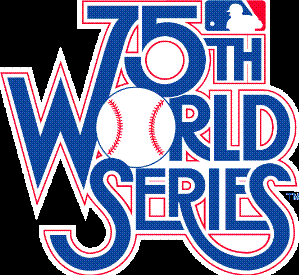
The 1978 World Series was the championship series of Major League Baseball's (MLB) 1978 season. The 75th edition of the World Series, it was a best-of-seven playoff played between the American League (AL) champion New York Yankees and the National League (NL) champion Los Angeles Dodgers. In a rematch of the previous year's World Series, the Yankees won, four games to two, to repeat as champions and to win their 22nd World Series. As of 2023, it remains the most recent World Series to feature a rematch of the previous season's matchup.

The 1977 World Series was the championship series of Major League Baseball's (MLB) 1977 season. The 74th edition of the World Series, it was a best-of-seven playoff played between the American League (AL) champion New York Yankees and the National League (NL) champion Los Angeles Dodgers. The Yankees defeated the Dodgers four games to two to win the franchise's 21st World Series championship, their first since 1962, and the first under the ownership of George Steinbrenner. Played from October 11 to 18, the Series was televised on ABC.
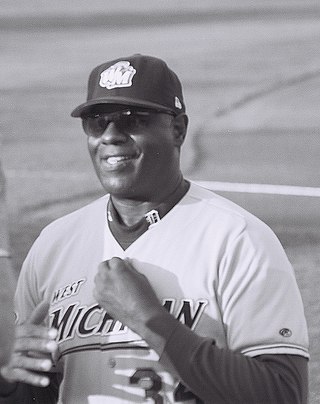
Bertram Ray Burris is an American former pitcher in Major League Baseball (MLB), and the current rehabilitation pitching coordinator in the Philadelphia Phillies organization. He played in MLB from 1973 through 1987 for seven different teams. Listed at 6 feet 5 inches (1.96 m) and 200 pounds (91 kg), he threw and batted right-handed.

The 2004 National League Division Series (NLDS), the opening round of the 2004 National League playoffs, began on Tuesday, October 5, and ended on Monday, October 11, with the champions of the three NL divisions—along with a "wild card" team—participating in two best-of-five series. They were:
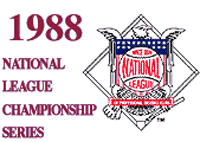
The 1988National League Championship Series was played between the National League West champion Los Angeles Dodgers and the National League East champion New York Mets. The Dodgers won the Series four games to three, en route to defeating the Oakland Athletics in five games in the 1988 World Series.
The 1985 National League Championship Series was played between the St. Louis Cardinals and Los Angeles Dodgers from October 9–16. It was the 17th NLCS and the first played under the new best-of-seven format. In previous years, the NLCS had been settled by a best-of-five format. This series is best known for Ozzie Smith's dramatic walk-off home run in Game 5. This is the second consecutive NLCS where a team overcame a 2–0 series deficit to win the series after the Padres did so in the best-of-five 1984 NLCS.
The 1974 National League Championship Series was a best-of-five series that matched the East Division champion Pittsburgh Pirates against the West Division champion Los Angeles Dodgers. It was the sixth NLCS in all. The Dodgers won the Series three games to one and lost the 1974 World Series to the Oakland Athletics.
The 1977 National League Championship Series was a best-of-five matchup between the West Division champion Los Angeles Dodgers and the East Division champion Philadelphia Phillies. It was the ninth NLCS in all. The Dodgers beat the Phillies three games to one and went on to lose the 1977 World Series to the New York Yankees.
The 1978 National League Championship Series was a best-of-five matchup between the West Division champion Los Angeles Dodgers and the East Division champion Philadelphia Phillies. It was the tenth ever NLCS and a rematch of the 1977 series between the same teams. The Dodgers beat the Phillies three games to one before they lost the World Series to the New York Yankees.
The 1981 National League Division Series (NLDS), the opening round of the 1981 National League playoffs which began on Tuesday, October 6, and ended on Sunday, October 11. The Division Series was created on August 6 in response to the 1981 Major League Baseball strike, which caused the cancellation of roughly one-third of the regular season between June 12 and August 9; by the time play was resumed, it was decided that the best approach was to have the first-half leaders automatically qualify for postseason play, and allow all the teams to begin the second half with a clean slate. The series were best-of-five games.
The 1981 Los Angeles Dodgers season got off to a strong start when rookie pitcher Fernando Valenzuela pitched a shutout on opening day, starting the craze that came to be known as "Fernandomania." Fernando went on to win both the Rookie of the Year and Cy Young Awards.
The 1981 Montreal Expos season was the 13th season in franchise history. They made it to the postseason for the first time in franchise history. Their playoff run ended in the NLCS against the Los Angeles Dodgers, with Rick Monday hitting a ninth-inning solo home run in game 5, subsequently referred to as "Blue Monday" by Expos fans. This was the closest the Expos ever got to a World Series appearance while in Montreal.

The 2008 National League Division Series (NLDS), the opening round of the 2008 National League playoffs, began on Wednesday, October 1 and ended on Sunday, October 5, with the champions of the three NL divisions and one wild card team participating in two best-of-five series. They were:
The 1980 National League West tie-breaker game was a one-game extension to Major League Baseball's (MLB) 1980 regular season, played between the Houston Astros and Los Angeles Dodgers to decide the winner of the National League's (NL) West Division. The game was played on October 6, 1980, at Dodger Stadium in Los Angeles, California. It was necessary after the Dodgers overcame a three-game deficit in the final three games of the season and both teams finished with identical win–loss records of 92–70. The Dodgers won a coin flip late in the season which, by rule at the time, awarded them home field for the game.
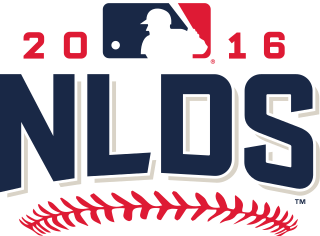
The 2016 National League Division Series were two best-of-five-game series to determine the participating teams in the 2016 National League Championship Series. The three divisional winners and a fourth team—the winner of a one-game Wild Card playoff— played in two series. FS1 and MLB Network carried all the games in the United States.

The 2017 National League Championship Series was a best-of-seven playoff pitting the Los Angeles Dodgers against the defending World Series champion Chicago Cubs for the National League pennant and the right to play in the 2017 World Series. The series was a rematch of the 2016 NLCS, which Chicago won four games to two en route to their first World Series victory since 1908. This was just the 10th time two teams have met in at least two straight League Championship Series, which have existed since divisional play began in 1969. The series was the 48th in league history. The Dodgers beat the Cubs in five games to win the NL pennant for the first time in 29 years, their last one in 1988.
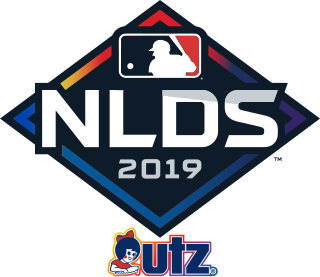
The 2019 National League Division Series were two best-of-five series in Major League Baseball (MLB) to determine the participating teams of the 2019 National League Championship Series. The three divisional winners, seeded first through third, and a fourth team—determined by the NL Wild Card Game—played in two series. These matchups were:
The 1981 Major League Baseball postseason was the playoff tournament of Major League Baseball for the 1981 season. The season had a players' strike, which lasted from June 12 to July 31, and split the season into two-halves. Teams that won their division in each half of the season advanced to the playoffs. Teams faced each other in a League Division Series for the first time, a round of the postseason that did not return until 1995, where it became a permanent addition. The winners of the LDS moved on to the League Championship Series to determine the pennant winners that face each other in the World Series.
The 1988 Major League Baseball postseason was the playoff tournament of Major League Baseball for the 1988 season. The winners of each division advance to the postseason and face each other in a League Championship Series to determine the pennant winners that face each other in the World Series.










